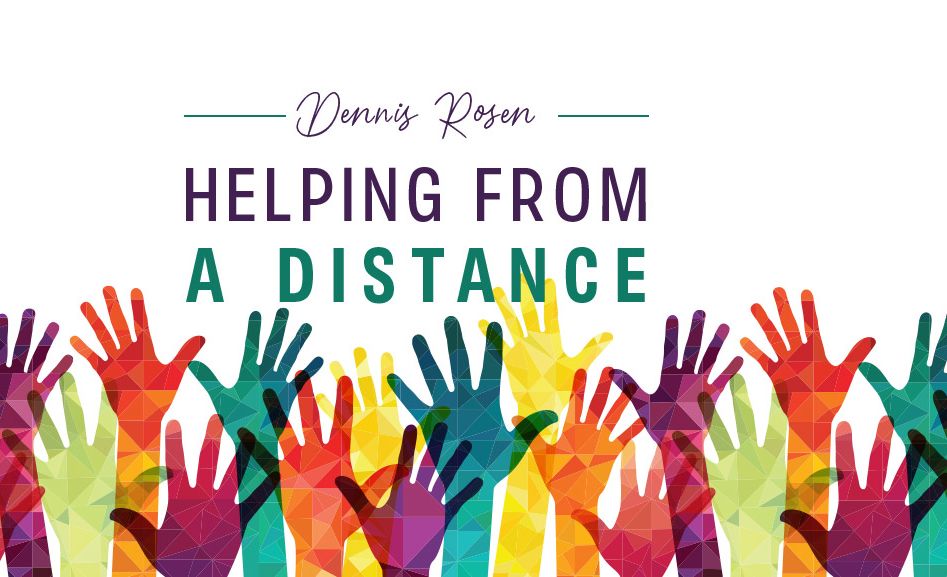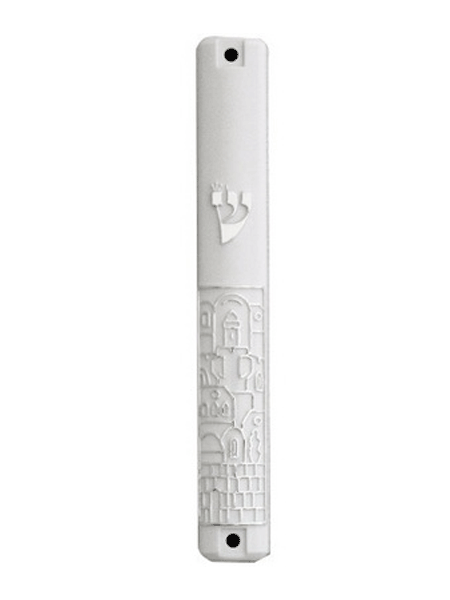
From San Francisco To Yerushalayim
I am positive that I drove my parents crazy. “Debbie,” my Mom would ask at the breakfast table, “do you want a piece of French toast?” “I want to go to Israel..

Part 1
The story of my first day in Yerushalayim is not nearly as dramatic as that of the Lelover Rebbe, Rebbe Moshe Biderman, the first Chassidic Rebbe to move to Yerushalayim.
Upon entering the Holy City, Reb Moshe suddenly took ill and was unable to leave his bed. He asked his Chassidim to carry him, bed and all, to the Kotel. As he was being carried down the steep steps leading to the Wall, Arabs pelted him with stones. The Chassidim turned around and returned home. Reb Moshe never made it to the Kotel. He passed away that same afternoon.
I only broke my foot.
* * *
1. A Love Affair
I was fourteen years old and I dreamed of moving to the Holy Land, the Land that God Himself promised to our people. My room was plastered with posters of Israel. My eyes would brim with tears as I soulfully sang “Yerushalayim shel Zahav” while ardently strumming my guitar and dreaming of the day when I, too, would enter the gates of the Holy City.
I am positive that I drove my parents crazy. “Debbie,” my Mom would ask at the breakfast table, “do you want a piece of French toast?”
“I want to go to Israel… but I wouldn’t mind some more French toast, thank you,” I would answer in all seriousness.
They just rolled their eyes while I continued dreaming.
In public school, I spent a morning standing in the hall for refusing to join in the Pledge of Allegiance. “After all,” I explained to anyone willing to listen, “if there were to be a war between Israel and the United States, I would be on Israel’s side, so I can’t pledge allegiance to the United States.”
The following year I enrolled in a religious girl's high school.
The years rolled past until -– finally –- I graduated high school. I would be spending a year studying Torah in Yerushalayim! I informed my parents that there was no reason for them to waste their money on a round-trip ticket. I was not planning to return to the United States -– except, perhaps, for a short visit, for old times’ sake.
I’m sure you get the picture. I was a starry-eyed teenager, madly in love with a romanticized version of Eretz Yisrael. Today, that love has matured, grown deeper and become genuine as a result of the more than thirty-five years that I have lived here.
2. London
I purchased a one-way ticket from San Francisco, California to London, England. It cost only $100. The flight was scheduled to arrive in England on erev Shabbat, which was also erev Tisha B’Av. That meant that I’d stay in London for Shabbat and Sunday before continuing to Israel.
Have you ever tried to pack a lifetime’s worth of belongings into two suitcases? I tried — without success. No matter how hard I pushed and crammed, I was unable to close the zipper of my enormous Army surplus duffel bag.
At ten-thirty p.m., less than twelve hours before the plane was scheduled to depart, I turned to my parents (which is extremely difficult for a teenager to do) and asked for their assistance. My father told me to sit on the duffel bag while he closed the zipper. The zipper closed, but the bag split in half.
Tears were coursing down my face. Would I have to take less? Would I actually have to use Israeli toilet paper? (I might have been an idealist, but there were certain limits.)
My father felt terrible. He raced out of the house in search of a luggage store still open at such a late hour. Two hours later he returned, a huge smile pasted across his face, waving a brand-new giant-size suitcase.
Although the suitcase was gigantic, it was still smaller than my scruffy army surplus duffel bag. I would never be able to stuff everything into it. “That’s not a problem,” my mother, always the pragmatic one, pointed out. “Instead of packing your heavy winter coat and rain boots, just wear them to the plane. You can take them off once you’re seated. That way, you’ll have plenty of extra room for all the toilet paper.”
It sounded reasonable, so I decided to do just that. That was my first mistake.
I was so excited about the upcoming trip that I barely closed my eyes the entire night. The following morning, I was up bright and early. Check-in was at eight o’clock. “There’s no reason to eat breakfast before you leave,” my mother said. “They’ll wine and dine you all the way to London.”
“But what if they forget my kosher meals?” I hesitantly asked.
“That’s ridiculous,” she replied with such confidence that I felt foolish for having even asked the question. I took my mother’s advice and left home without eating.
That was my second mistake.
My fellow passengers stared at me as I entered the plane wrapped in a warm woolen coat adorned with a rabbit-fur collar. I just stared back. They were a motley bunch of “children of the sixties,” with raggedy beards and love beads. No one looked Jewish, let alone orthodox.
The plane was packed. The moment I squeezed my 5-foot-8 frame into my tiny seat, I realized why the flight was so inexpensive. The air conditioner leaked; there was a steady stream of water dripping on my head (somewhat akin to Chinese water torture). Since there were no empty seats, I resigned myself to my fate and donned my floppy, bright-yellow rain hat (the one that had been too big to fit into the suitcase). “Eretz Yisrael is acquired through hardships," I thought, "and it looks as if I’m beginning right now!”
As soon as the plane ascended, the stewardesses began serving breakfast. But there were no kosher meals.
It was 1970. Overseas phone calls were reserved for dire emergencies. I had written a letter to one of the orthodox organizations located in Stamford Hill, informing them that I would be arriving on Friday morning and requested Shabbat hospitality. Before leaving, I wrote the organization’s number on a small paper and placed it securely in the pocket of the striped purple, green and yellow dress (psychedelic was very in) that my mother had lovingly sewn for the trip.
We landed in the early hours of the morning. I took a train into the city and waited until nine o'clock to call. I was looking forward to a warm, heimishe Shabbat (not to mention breakfast and a bed to rest in). But at nine o’clock, when I reached into my pocket for that all-important piece of paper with the phone number on it, it was gone. It was not there!
I phoned information and was given the organization’s previous number. I tried calling, but there was no answer. By eleven o’clock, I was becoming frantic — as well as dizzy from hunger and lack of sleep!
Although there were plenty of fast-food restaurants in and around the bus stop, nothing was kosher. I asked information desk at the bust station for a London directory, not realizing that greater London is divided into several sections, each one with its own phone book. I was given the Central London Directory – but there were (and, I believe, still are) very few, if any, orthodox Jews living in Central London.
My fingers flew through the yellow pages, looking for yeshivot, seminaries, schools. But I came up with nothing (except for a few evangelistic seminaries, which I didn’t think were appropriate).
I phoned the synagogues, but my calls were unanswered. I even tried a couple of kosher butcher shops, assuming that if they were kosher, the people working there might have an idea where I could go for Shabbat. But when the woman at the butcher shop brusquely responded, “Lady, we sell kosher meat, we do not sell Shabbat,” I realized that I had better try a different approach.
I thought Lubavitch was spelled with an “a” instead of a “u”, and was shocked that there were no Lubavitch centers in London. The Jewish refugee society (I assumed that I probably qualified) informed me that although there was available place in their home, it was neither kosher or shomer Shabbat.
I knew that Stamford Hill was a Jewish neighborhood and decided to take a bus there. Surely I would find someone willing to take me in for Shabbat.
I put on my fur coat, stuck my floppy yellow rain hat deep into my pocket, donned my winter boots, grabbed my luggage — suitcase, backpack, guitar, hand luggage, overstuffed handbag and camera — and began walking, if it could be called that, to the bus stop.
I almost didn’t make it. England is a backward country, and the cars drive on the wrong side of the road. Luckily, the driver slammed on the brake before slamming into me.
It was – shall we say – difficult to climb onto the red double-decker bus while trying to appear poised and sophisticated. Everything was so — so — well, just so English! I was amazed that everyone spoke with a chic English accent. I felt extremely cosmopolitan and grown-up.
I handed a few coins to the woman collecting the fares. She took my money and bellowed, “Why look at what we have here! A donkey. A real live donkey.”
I did not feel cosmopolitan and grown-up anymore.
Somehow (don’t ask me how) I managed to get off the bus at Stamford Hill. Clutching my suitcase, I saw an obviously Jewish-looking woman walking toward me. I approached her and politely asked, “Excuse me, are you Jewish?”
“Yes,” she answered. She stared at me as if I was a visiting alien from the planet Mars.
“Do you know of a place where I could spend Shabbat?”
“No,” she replied, scurrying away as fast as she could.
This was not the right approach.
I tried a different tactic with the next woman. “A gutten erev Shabbos,” I began, hoping that she’d appreciate the fact that we spoke the same language.
“You know, taka, I have a bit of a problem, real tzurus. Uh, I just flew in from San Francisco, and I was supposed to be spending Shabbos by a frum, heimishe mishpocha. But now I’m mamash stuck and I mamash don’t know what to do (and I mamash hoped she would realize that I’m mamash Jewish!).”
After interrogating me about the San Francisco Jewish community, the woman was much more accommodating. But she had three older sons, so it would be out of the question for me to stay at her home. She gave me exact directions to another family, as well as her phone number. “If you run into any difficulties, feel free to call,” she smiled. “I’ll be happy to help you.”
I was looking forward to a warm meal and a comfortable bed. But it wasn't long before I realized that I was lost. I knocked on the first home sporting a prominently displayed mezuzah. A woman wearing a housedress and tichel, obviously in the midst of her Shabbats preparations, opened the door.
I had to steady myself to keep from toppling over. “Excuse me, do you have a phone?” I asked.
“Yes.” The woman eyed me with suspicion.
“Could I use it, please?”
“No,” she replied, without beating around the bush. With my bloodshot eyes and slurred speech, and my winter coat and fur boots, I did not look like the typical Bais Yaakov girl.
I decided that I must eat before I could continue. I had to find a restaurant. I noticed three yeshivah bachurim standing outside a public telephone booth and started to ask them where I could find a restaurant with a reliable hechsher. But I was only able to say a few words before I burst into tears.
I somehow managed to blurt out my entire story. The bachurim grabbed my bags and brought me to a lovely family, where I spent Shabbos and Tisha B’Av.
To be continued…
(More of Debbie Shapiro's stories can be found in Bridging the Golden Gate)











Tell us what you think!
Thank you for your comment!
It will be published after approval by the Editor.